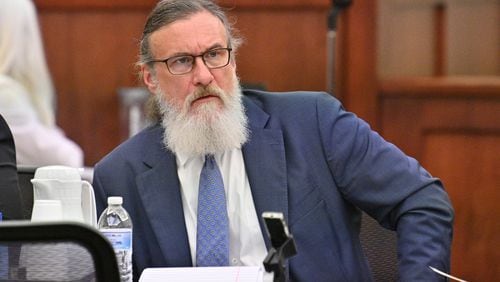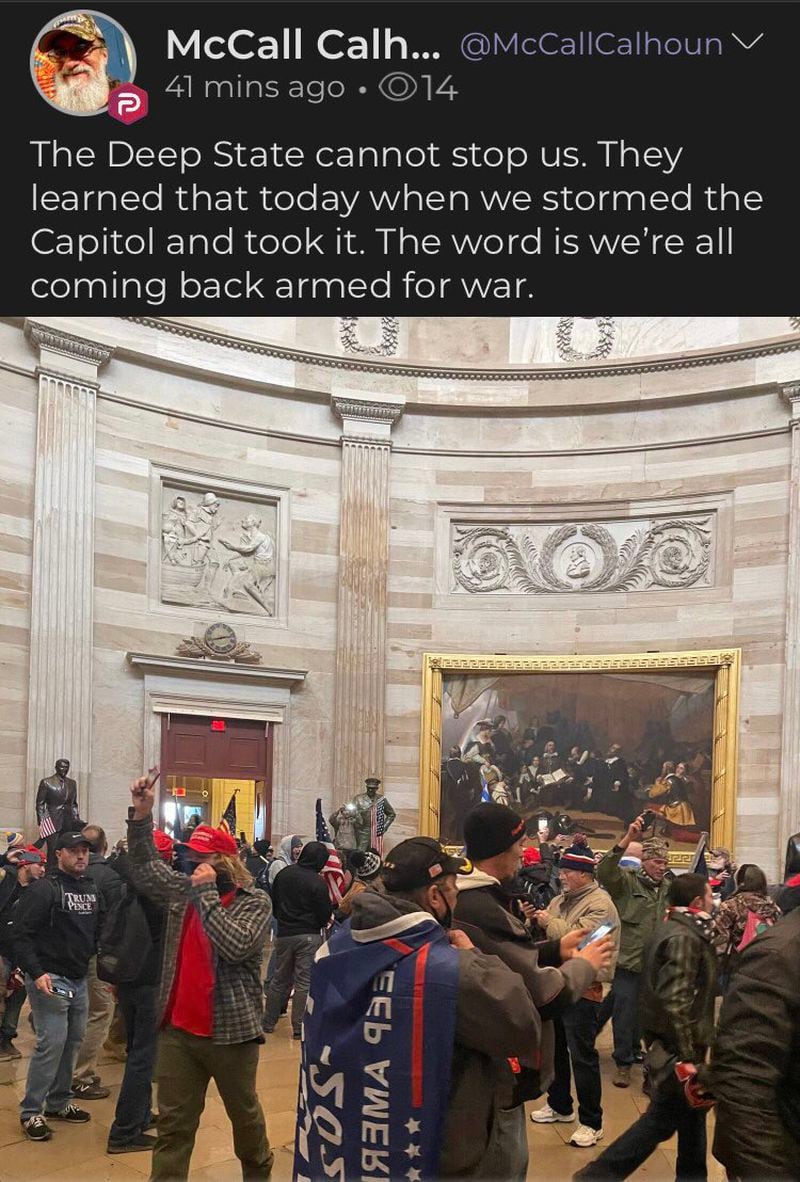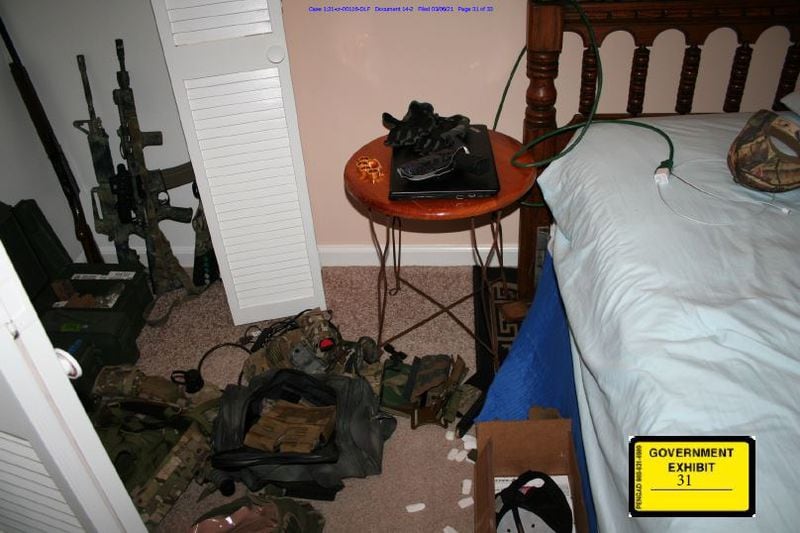WASHINGTON, D.C. — William McCall Calhoun Jr.’s face reddened as U.S. District Court Judge Dabney L. Friedrich read a lengthy explanation for her guilty verdict in Calhoun’s charges related to his participation in the Jan. 6, 2021, U.S. Capitol riot.
As she spoke, it was clear Friedrich believed federal prosecutors proved beyond a reasonable doubt that Calhoun, a southwest Georgia lawyer, came to Washington with the intent to disrupt Congress’ count of electoral ballots that would send Joe Biden to the White House. The felony conviction could send the 59-year-old Americus resident to federal prison for 20 years.
But Friedrich spent much of the two-and-a-half hour hearing intensely questioning prosecutors on what made Calhoun a felon when so many of the nearly 1,000 people so far charged in the riot face misdemeanors for basically the same behavior.
In the final analysis, Friedrich found the government proved its case and she pronounced Calhoun guilty of obstructing Congress, a felony, and four additional misdemeanor charges. But, she said, she would diverge from federal felony sentencing guidelines and impose a sentence more in line with defendants found guilty of lesser offenses.
She expressed “frustration” with the inconsistency with how the Department of Justice had charged Jan. 6 defendants.
“This case in the court’s view appears to be much more in line with the misdemeanor cases it has seen,” Friedrich said.
Indeed, Calhoun’s codefendant, Buford resident Verden Andrew Nalley, was by Calhoun’s side throughout that day at the Capitol and was allowed to plead guilty to a misdemeanor, receiving two years probation and no jail time.
Prosecutors rested much of their case on the social media posts Calhoun wrote before, during and immediately after the riot as evidence that he came to Washington intending to storm the Capitol and stop the vote count. Those posts delved into conspiracy theories and promised violent retribution on Democrats. The posts from the Capitol offered a blow-by-blow of the actions of the first few hundred rioters to breach the Capitol, a group Calhoun repeatedly referred to as “the Vanguard.”
Nalley made no such posts. His account on Facebook was suspended.
Calhoun, a criminal defense attorney from Americus, Ga., was among the very first of the rioters to enter the U.S. Capitol through a breached door on the Senate side of the building, making it as far as then-House Speaker Nancy Pelosi’s office.
In his trial held March 1-2, those social media posts were a large part of the evidence used against him. Calhoun, who testified in his own defense, claimed he was merely following the crowd as it walked from the rally held by Donald Trump to the Capitol grounds.
“I did not and, even now, I don’t believe I did violate any felony statute because there’s nothing — there’s no act involved to commit a felony,” he said. “I mean, there’s not anything I did except walk through the Capitol.”
Friedrick signaled her frustration early in Monday’s verdict hearing, peppering prosecutors with questions about Calhoun’s conduct while inside the Capitol. Prosecutors had hundreds of social media posts, photos, videos made or taken by Calhoun before, during and after the Capitol riot, as well as security camera footage from inside the Capitol, but there was no evidence that Calhoun took some of the more extreme actions of other Jan. 6 defendants facing felony charges.
“There is no evidence that he personally overran the barricades,” the judge said. “Did he push the crowd?”
Prosecutor Christopher Brunwin said Calhoun should be judged by “the totality of the circumstances,” including his weeks of haranguing, often violent, social media posts. But Freidrich returned again and again to Calhoun’s behavior while in the Capitol, questioning why others who entered the Capitol and left without committing violent acts were charged with misdemeanors.
“The government should treat similarly situated individuals similarly,” she said.
Calhoun, is believed to be the only practicing attorney among the Jan. 6 defendants across the country. He has continued his law practice in southwest Georgia, wearing a court-ordered ankle monitor as he awaited trial in Washington. He appeared in court Monday with his usually long hair cropped short and clutching a small Bible in one hand.
His felony conviction means his law license is in jeopardy. He declined to comment after Monday’s verdict. A sentencing date has been tentatively set for July 6. Calhoun through his attorney told the court he may need more time to shut down his law practice.
He testified at his trial that his writing style on social media was intentionally overblown and hyperbolic. The judge said Monday his testimony lacked credibility.
Still, Calhoun had said at trial that his aggressive online rhetoric was more to “troll” his critics on the internet than to accurately reflect what he saw and heard while in the Capitol. He spent the month leading up to the November 2020 presidential election and the weeks that followed composing posts so laced with conspiracies, violent fantasies and threats of civil war to his thousands of followers on Facebook, Parler and Twitter that he was being monitored by the FBI and the U.S. Secret Service.
“We have a communist revolution happening before our very eyes to steal this election,” he wrote in a post a day after the presidential election. “Americans get ready to rise up and kill the Democratic communists before they do it to us.”
On Nov. 7, 2020, Calhoun wrote that he and others would go from door to door in Atlanta “and execute the (expletive) communists.”
After the riot, he described his actions that day in a post on Parler.
“We overran multiple police barricades and busted through,” he wrote on the social media platform Parler. “The first of us who got upstairs kicked in Nancy Pelosi’s office door and pushed down the hall towards her inner sanctum. The mob was howling with rage. Crazy Nancy probably would have been torn into little pieces, but she was nowhere to be seen.”
In his federal court case, Calhoun chose to bypass a jury and opted for a “bench trial,” taking his case directly to Friedrich, who took the next two weeks to formulate her verdict.
When the case appeared headed to a jury, Calhoun’s attorneys attempted to block prosecutors from using his social media posts as evidence. He also asked the court to return to him the firearms seized by the FBI. Investigators collected four AR-15 assault-style rifles, four shotguns and a 9 mm automatic pistol when they arrested Calhoun, and photos taken from his home show cases of ammunition.
Friedrich denied both motions.
Calhoun traveled to Washington with Nalley, a friend and construction worker from Buford with whom Calhoun had attended so-called “Stop the Steal” protests in downtown Atlanta prior to the Capitol riot. The fact that he was not given a similar deal as his co-defendant with no jail time appears to be one reason why Calhoun opted to take the charges to trial.
“They offered me a felony,” he told the Atlanta Journal-Constitution in an interview last year. “I know I didn’t commit a felony.”
Credit: U.S. Department of Justice
Credit: U.S. Department of Justice
Calhoun’s defiance about the charges has been a constant element of his defense since his arrest.
“I posted photographs, and I posted videos because I did not do anything wrong. OK?,” he said in a March 5, 2021, bond hearing. “Maybe I trespassed. Big deal. Don’t steal elections next time.”
He has been under house arrest while not working in his law practice and has never tempered his opinion about the Capitol riot.
In a hearing before a judge in Cordele when one of his criminal defense clients asked to have him removed from his case, Calhoun complained about his arrest and incarceration.
“My position on that is somebody had to do it. OK? I would do it again 100 times if I were in the same situation,” he said, according to a transcript read during his trial in Washington. “That’s just how I feel about it.”
Calhoun sang a different tune when asked about the event during his own trial.
“I don’t believe I would come back to Washington, much less go into the Capitol if I had my way about things,” he said.
Credit: U.S. Department of Justice
Credit: U.S. Department of Justice
In addition to the felony, the four misdemeanor convictions handed down by the judge on Monday were: Entering a restricted building; disorderly and disruptive conduct in a restricted building; disorderly conduct in a Capitol building; and illegally demonstrating in the Capitol building.
With the felony conviction on his record, Calhoun is likely to face new challenges to his Georgia law license.
The State Bar of Georgia has reportedly received several requests to revoke Calhoun’s license to practice law, but before Monday he remained in good standing with the organization. Jennifer Mason, spokeswoman for the State Bar, said the organization does not comment on grievances filed against attorneys, but she said lawyers are generally only held to account for their behavior while serving as attorneys.
“The Bar only has jurisdiction over lawyers in their professional lives, so the rules do not cover personal conduct unless a member is convicted of a crime,” she said.
Not everyone agrees with that position. In an interview last year with the AJC, former State Bar President Lester Tate said he was “shocked’ by the bar’s position, especially considering the deep dive the organization does into the personal lives of lawyers when they seek admittance to the bar.
“When you go to apply to be a member of the Bar, they do credit checks, all sorts of stuff in your background to make sure that you meet the standards to be a lawyer,” he said.









